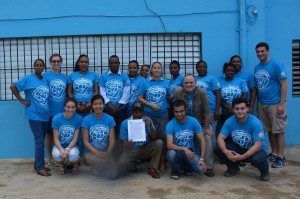Engineers Without Borders is a worldwide collection of 14,700 students representing 39 countries who use their knowledge of science and mathematics to improve the lives of millions of people around the world.
As a top-tier engineering school, the University of Rochester has its own chapter within Engineers Without Borders.
The UR team is comprised of 35 members who hail from many different disciplines, ranging from engineering to psychology, to violin performance to film.
They meet weekly on Tuesdays at 8:00 p.m. to “try to tackle the next steps for the program and for our member development, including planning workshops and events, documenting and planning the current step of the project and securing funds for our endeavors,” according to junior Christian Freitas, former President and current Vice President.
The program aims to build a relationship between what students learn in lectures and how to apply those skills to improve communities around the world that perhaps do not have the capabilities or resources to do so.
Beyond engineering, the program teaches students to manage their budget, deposit checks and decide on the appropriate allocation of materials and plan for fundraising.
Through money management and engineering planning, students are taught to work as a cohesive unit in order to design and build sustainable systems.
Since 2009, UR’s Engineers Without Borders team has been working relentlessly on multiple projects to improve the lives of 2.5 million people around the world.
Engineers Without Borders conquered perhaps one of their biggest endeavors just two weeks ago, when they went on their first ever assessment trip–a trip that allows members of a specific Engineers Without Borders chapter to assess the economic, social and environmental risk factors in a community. Using these factors, they decide what type of sustainable design to implement in order to solve these problems.
These programs must be approved by the national Engineers Without Borders board, and entail a five-year commitment to a specific community.
From Jan 3–12, the Rochester chapter ventured to Escuela Taller Santa Maria Josefa Rossello, a school in the town of Don Juan, located in the Monte Plata Province of the Dominican Republic, in order to solve a crisis of water sanitation.
The school is a public institution of over 400 students, ranging from pre-K to 8th grade.
Rochester’s Engineers Without Borders stepped into the community after learning about the school’s inability to distribute clean water to its students, which stemmed from a deficiency of electrical durability and water maintenance technologies.
The students spent ten days testing the water’s sanitation and chemical properties, bacteria content and contamination levels and then went to local plumbing stores to seek out resources that they could use to develop sanitation systems.
The team also met with local organizations, including Associación de Padres, Madres y Amigos de la Escuela (the Association of Fathers, Mothers and Friends of the School), as well as the Santo Domingo Rotario Bella Vista Club (an international Rotary community service organization).
Engineers Without Borders finally signed the official program contract with Associación de Padres, Madres y Amigos de la Escuela and two non-government sponsored organizations, Father Ron Faesser Projects and Daughters of Our Lady Mercy.
“We are helping communities achieve the level of life they want by the means they see fit,” said Grace Caza, one of two project chairs for the Don Juan trip. “It’s a learning process, and just being part of that process has motivated my desire to study engineering and pursue a career in community driven development programs.”
In addition to meetings with official organizations, Engineers Without Borders further interviewed and administered surveys to faculty and students of the school.
While in the Dominican Republic, the Engineers Without Borders students were housed and fed by families of the Las Casitas neighborhood.
The trip, however, did not come easy. The students worked relentlessly to develop design plans,
submit project proposal forms regarding their plans to improve water sanitation facilities in Don Juan and to fundraise enough money to execute the trip.
One year and $7,000 later, the students traveled to Don Juan for a life-changing ten days.
However, Engineers Without Borders isn’t stopping here.
Last week, the students met with their community advocate P. Ron Gaesser and the Marcellus Rotary Club Representative Jim Gascon to discuss future fundraising plans, program design and budgeting.
Junior Emily Kwan, a member since her freshman year, former Secretary, Vice President, Publicity Coordinator and current President, discuss her hopes for the future of Engineers Without Borders.
“Having seen many facets of this organization, one of the visions I have as President is to instill the belief that all the work we do is important to UR Engineers Without Borders,” Kwan commented.
“Whether a member is designing a flyer for an upcoming event, researching possible grants or filling out official program documents, that member should feel ownership and pride in what we are doing as a whole organization.”
Kaplan is a member of the class of 2018.






